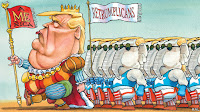I asked Nancy that question recently. Her response: "If God doesn't exist, then how did we get here?" That's a useful way to phrase the question, because it helped me to articulate my own belief: God as depicted in The Bible is not necessarily the same thing as the creator of the universe, if there was one. I'm not sure about a creator, as I'll explain.
Begin with the question: was the universe created, or has it always existed? Some (including Plato's Timaeus) would say that it must have been created, because it exists, and nothing can exist unless it is first created. I can accept the possibility of a creator.
But a true creator -- a force that set creation in motion but was not itself created by anything --- would be an entity totally beyond our understanding. Maybe not even an entity at all. A force that acted, but was not acted upon? It's hard to even think about it. As Timaeus said, the father of all this (if there is one) is beyond our knowledge.
But assuming there was a creator, I have difficulty reconciling that entity with the God presented in The Hebrew Bible and The New Testament.
I refer now to the God that spoke directly to early Biblical figures and intervened in human affairs; expects us worship him ("Praise ye the Lord", as the Anglican service puts it); who expects us to obey his commandments, and punishes us if we don't; who loves us and has a plan for us all; who sent his son Jesus to us and then took him away to atone for man's sins.
I struggle with the idea that the sort of creator I'm talking about would do such things. Such a creator would be so different from us that it might not even be aware of mankind, let alone bother to watch over and judge us.
I am aware that I'm applying human concepts to something that, if it exists, is beyond our understanding. As theologians tell us, it's a mistake to try to apply logic and reasoning to what is essentially a matter of faith.
Still, I have to believe that the God of The Bible and other monotheistic religions is a man-made concept. It must have emerged as an attempt to answer the deepest questions. Why does the world appear as it does? Intelligent design, or evolution? How did all this come to be? Was it created? I never will know the answers, nor will any human being. The questions are too vast. They are beyond our capabilities.
There is much value and wisdom to be found in The Bible and the sayings of Jesus, and The Torah, and no doubt other religions as well. As well as some very eloquent writing. But I am left with little faith, just a series of questions. As I've said before, I do pray in times of crisis. But I'm not sure anyone is listening.




